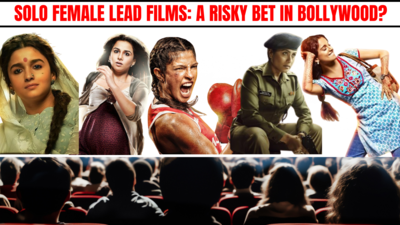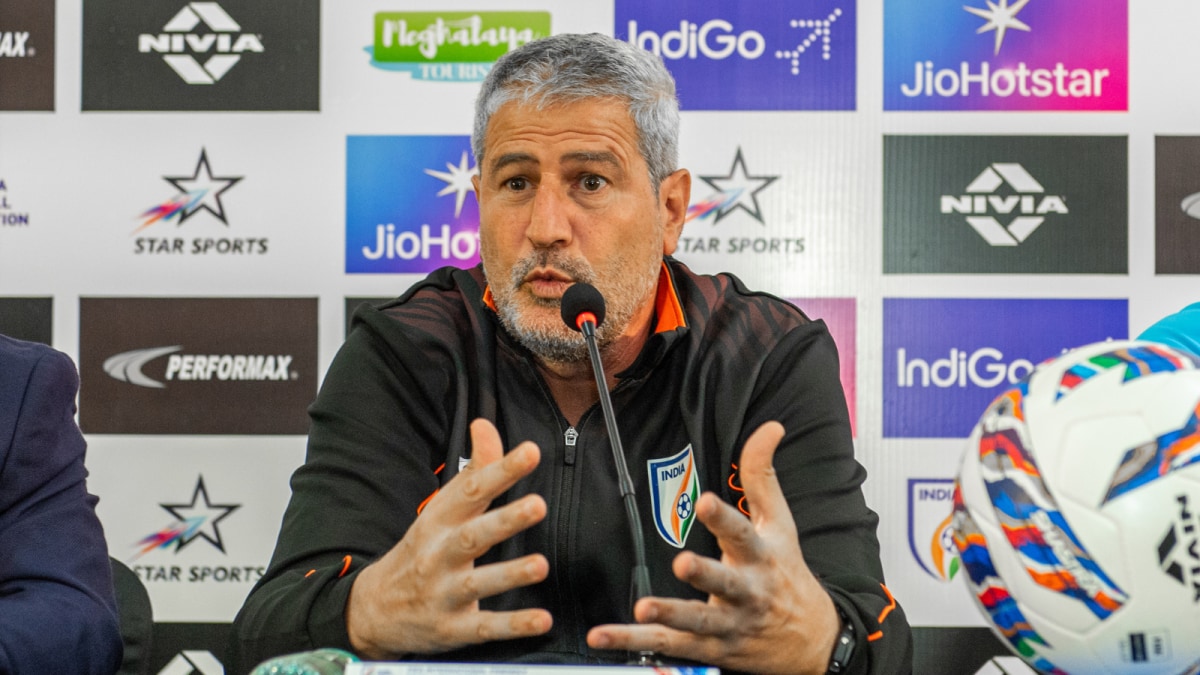ARTICLE AD BOX

Not so long ago, the idea of a woman ‘carrying’ a big Bollywood film on her shoulders was met with nervous laughter. Producers would whisper about ‘limited appeal’, distributors would sigh, and audiences supposedly wouldn’t turn up.
But in 2025, are we still shackled to this old stereotype? Or is the tide finally turning for women-led cinema in Hindi films?The audience has changed, at least in the citiesIt’s impossible to ignore how much the Indian audience, especially in urban pockets, has evolved. Young viewers in metros, who live on Instagram reels and global pop culture, now cheer as loudly for Alia Bhatt’s ‘Gangubai Kathiawadi’ as as they do for a Shah Rukh Khan’s ‘Pathaan’.
They are also quicker to embrace a story purely on merit, whether it’s about a girl running away from her wedding or one taking down terrorists.Kajol summed up this shift beautifully when she told PTI back in 2018, “I think the talk about it right now is because it's finally become financially viable and the numbers are coming in. I think that's the main difference. Such films were always being made but they were not doing well as other films were or maybe the ratio was much less.
The ratio and the numbers are adding up now."
I thank our audiences for changing the mindset and deciding they want to watch every kind of films. Finally, it has become financially viable to even think of projects that don't have big superstars in them.
Kajol
The shift is undeniable. Films like ‘Raazi’, which crossed over Rs 195 crore worldwide, or ‘Gangubai Kathiawadi’, which stormed past Rs 200 crore despite being helmed almost entirely by Alia Bhatt, would have been unthinkable a decade ago. Even a gritty film like ‘Kahaani’ once upon a time seemed like a brave gamble, yet its runaway success set the template for many.The genres that love female leads the mostBut if you look closer, you’ll see a pattern.
Certain genres have turned out to be happy hunting grounds for female stars. Thrillers and horror? Women are absolutely killing it, sometimes literally! From Vidya Balan’s ‘Kahaani’ and ‘Jalsa’ to Nushrratt Bharuccha’s ‘Chhorii’ and now Kajol’s ‘Maa’ the industry seems to trust that audiences will show up to watch women unravel mysteries or face down demons.Biopics and sports stories? Again, a steady favourite- ‘Mary Kom’ put Priyanka Chopra in the boxing ring and the Rs 100 crore club, while Deepika Padukone’s ‘Chhapaak’ might not have smashed records but still found a devoted audience.Social dramas led by women also keep popping up - ‘Pink’, ‘Thappad’, and ‘Mimi’ come to mind. But try finding a big-ticket masala comedy headlined by a woman. Or a full-on high-budget actioner without endless talk of it being a ‘risky experiment.’That’s why all eyes are on the upcoming ‘Alpha’, starring Alia Bhatt and Sharvari Wagh. Can two women lead an adrenaline-pumping spy flick without being constantly called ‘brave choices’? Bollywood’s still waiting for its ‘Wonder Woman’ moment.The Priyanka effect: “Why do you want to do ‘Fashion’?”No story on solo female films in Bollywood is complete without revisiting Priyanka Chopra’s career. She famously swam against the tide early on. In a past chat with TOI back in 2023, she recalled, “I was told back then, ‘Ladkiya female-oriented films apne career ke end mein karti hai National Awards ke liye. You just did Aitraaz, tumhara career abhi shuru hua hai, why do you want to do Fashion?’ … People were apprehensive about female-oriented cinema.
I wanted to play interesting characters instead of just being a part of big films, and I loved the script of Fashion, so I went ahead with it.” Of course, ‘Fashion’ went on to win her a National Award and also did excellent business, changing the landscape for many who came after. In another chat with TOI in 2018, Priyanka revealed her bigger dream:
I hope that in my lifetime, I get to see that a female-led film has broken the number records, which Wonder Woman did in 2017. We finally had a woman superhero film, directed by a female and it earned big money in the global entertainment industry. I hope that in my lifetime, I can see more movies like that. That will change the mindset of the society in general – where you can accept a woman as a hero, where it’s OK for a boy to say I want to be like her.
Priyanka Chopra Jonas
Does the actress matter more than the story?Many people would still quietly point out that there’s a big difference between a film being ‘female-led’ and ‘female-led by Alia Bhatt.’ The former still makes producers sweat; the latter gets funded without blinking. Just look at how ‘Gangubai Kathiawadi’ was sold almost entirely on Alia’s shoulders (also a bit by Sanjay Leela Bhansali.)
A lesser-known actress may not have even gotten that script greenlit easily. Kajol had explained this best when she said, "If you look at the best directors, I'm not talking about movies but directors, all of them have had very strong characters, very strong female characters in their films. I think every character of theirs has been well rounded and so I think that's the most important point that we need to take home with us."
It’s not about gender alone — it’s about power, credibility, and who puts bums on seats.Moving past trauma and revenge talesFor years, solo female films meant only one thing, tragedy. Either she was out to avenge (‘Mom’, ‘NH10’), or battling brutal patriarchy (‘Chhapaak’, ‘Thappad’). Important films, no doubt, but why did a woman have to suffer unimaginable trauma to be ‘interesting enough’ for a movie?Zoya Akhtar nailed it when she told IANS, “Every time we have a woman on-screen, we can empower her in a different way rather than just giving a speech on the importance of equality and empowerment.
I think sometimes we have to show her as powerful. I think the influx of women at the workplace is also changing the narratives in our cinema.” Imagine more women playing con artists, outlandish lovers, or even corrupt politicians.
The audience is ready, the industry just needs to catch up.Has OTT made it safer to experiment with women-led stories?Streaming platforms have changed the game. Films and shows like ‘Do Patti’, ‘Mrs’, ‘Delhi Crime’, ‘Bombay Begums’, ‘Hush Hush’, ‘Dahaad’ and countless others have proven that audiences are hungry for strong women protagonists.
Huma Qureshi is a perfect example; she’s led ‘Maharani’ and also taken on solid parts in films that might never have made it to theatres at scale.In her past interview with PTI, Huma pointed out, “In the recent years, we are seeing more such (women centric) films, the new term is female-led films. For me, it is not the female-led films that are creating a sense of empowerment. Today, when I read a script, the character of the girl is not just contributing towards the hero’s journey or is not someone waiting for the war hero to return home.
Rather, we think why can’t a girl go on the border? So, that shift in the way we are approaching stories, storytelling has come about.
”OTT lets creators take these chances without being strangled by opening weekend pressure. But ironically, it also becomes an excuse. Many producers still prefer ‘testing’ women-led stories on streaming before risking theatre screens.Huma Qureshi on sexism and strong female rolesHuma has always been vocal about the difficulties of finding meaty roles. As she told had TOI,
It is difficult to get well-written female parts. We as a society don’t like strong women. We like women who are not vocal about what they think and feel. That reflects in our films as well. But now times are changing and female-centric roles are more in demand
Huma Qureshi
And it’s true.
From ‘Queen’ giving us Rani’s solo honeymoon, to ‘Raazi’ showing a newlywed wife who is also a spy, the stories are getting bolder.So how long before these films stop being called a ‘risky bet’?Realistically, we may still be a few big hits away. Bollywood may need around half a dozen consistent Rs 150+ crore grossers led by women across genres before the ‘risky bet’ tag vanishes to a certain extent.It’s an exciting time for Hindi cinema. Young audiences have already opened their wallets and hearts to women leading the charge. The biggest sign of real change will be when we stop prefixing films with ‘female-led’ like it’s a genre in itself. Imagine a day when a film starring Vidya Balan, Priyanka Chopra, or Kiara Advani in the lead is simply called… a film. Not a ‘bold risk’, not a ‘brave choice’, not a ‘female-fronted bet.’ Just a story worth watching.Till then, it’s one hit at a time. And who knows? Maybe in just a handful of hits, Bollywood will finally stop asking, “Are solo female lead films a risky bet?”



.png)
.png)
.png)
















 4 hours ago
5
4 hours ago
5









 English (US) ·
English (US) ·